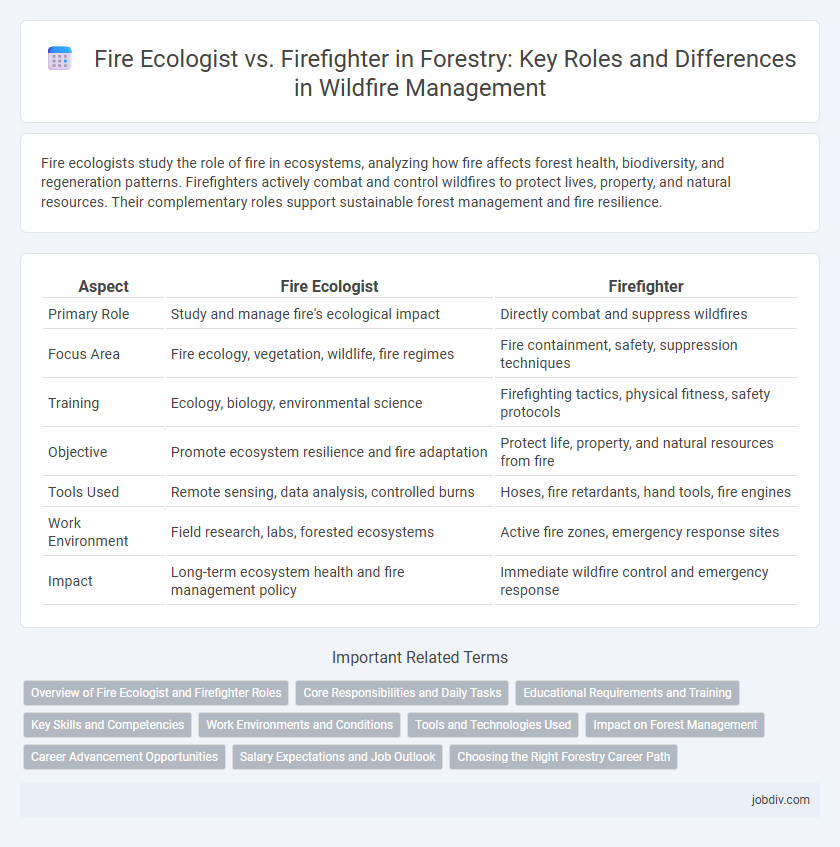Fire ecologists study the role of fire in ecosystems, analyzing how fire affects forest health, biodiversity, and regeneration patterns. Firefighters actively combat and control wildfires to protect lives, property, and natural resources. Their complementary roles support sustainable forest management and fire resilience.
Table of Comparison
| Aspect | Fire Ecologist | Firefighter |
|---|---|---|
| Primary Role | Study and manage fire's ecological impact | Directly combat and suppress wildfires |
| Focus Area | Fire ecology, vegetation, wildlife, fire regimes | Fire containment, safety, suppression techniques |
| Training | Ecology, biology, environmental science | Firefighting tactics, physical fitness, safety protocols |
| Objective | Promote ecosystem resilience and fire adaptation | Protect life, property, and natural resources from fire |
| Tools Used | Remote sensing, data analysis, controlled burns | Hoses, fire retardants, hand tools, fire engines |
| Work Environment | Field research, labs, forested ecosystems | Active fire zones, emergency response sites |
| Impact | Long-term ecosystem health and fire management policy | Immediate wildfire control and emergency response |
Overview of Fire Ecologist and Firefighter Roles
Fire ecologists study the effects of fire on ecosystems, focusing on fire behavior, vegetation recovery, and long-term environmental impacts to inform land management and conservation strategies. Firefighters specialize in wildfire suppression, utilizing tactics and equipment to protect lives, property, and natural resources from active fires. Both roles are essential but differ in approach, with fire ecologists emphasizing prevention and ecosystem health while firefighters handle immediate fire containment and control.
Core Responsibilities and Daily Tasks
Fire ecologists analyze fire behavior, study ecosystem responses to wildfires, and develop management strategies to maintain healthy forests. Firefighters engage in active wildfire suppression, conduct controlled burns, and perform emergency response duties to protect lives and property. Both roles require extensive knowledge of fire dynamics but differ in focus: ecological impact versus immediate fire containment.
Educational Requirements and Training
Fire ecologists typically require advanced degrees in ecology, forestry, or environmental science, often holding a master's or doctorate emphasizing fire behavior, ecosystem dynamics, and fire management strategies. Training involves extensive research methodology, controlled burn techniques, and data analysis to understand fire's ecological impact. Firefighters usually complete specialized fire academy training focused on fire suppression tactics, emergency response, physical fitness, and safety protocols, often supplemented by certifications like wildland firefighting (e.g., S-130/S-190 courses).
Key Skills and Competencies
Fire ecologists possess expertise in understanding fire behavior, ecosystem dynamics, and post-fire recovery processes, enabling them to analyze fire patterns and develop sustainable management practices. Firefighters demonstrate physical endurance, rapid decision-making abilities, and proficiency in fire suppression techniques essential for controlling and extinguishing wildfires. Both roles require knowledge of fire science and risk assessment, but fire ecologists emphasize ecological impact analysis while firefighters focus on immediate fire containment and public safety.
Work Environments and Conditions
Fire ecologists primarily work in research settings, national parks, and forest management agencies, analyzing fire behavior and its ecological impact under variable weather and vegetation conditions. Firefighters operate in high-risk, physically demanding environments including wildlands, urban interfaces, and disaster sites, often facing intense heat, smoke, and rapidly changing fire lines. Both roles require adaptability, but fire ecologists focus on long-term ecosystem health while firefighters prioritize immediate fire suppression and public safety.
Tools and Technologies Used
Fire ecologists utilize remote sensing technologies, geographic information systems (GIS), and drone surveillance to analyze fire behavior, assess ecosystem impacts, and develop fire management plans. Firefighters rely on specialized equipment such as fire engines, hand tools like Pulaskis and McLeods, thermal imaging cameras, and protective gear designed for rapid response and containment of wildfires. Both roles incorporate advanced weather monitoring systems and communication devices to coordinate efforts effectively during fire incidents.
Impact on Forest Management
Fire ecologists analyze fire behavior and ecosystem responses to develop strategies that enhance forest resilience and biodiversity. Firefighters implement suppression techniques to control wildfires promptly, minimizing immediate damage to timber and wildlife habitats. Integrating ecological insights with suppression tactics optimizes forest management by balancing fire prevention and ecosystem health.
Career Advancement Opportunities
Fire ecologists advance their careers by engaging in research, environmental policy development, and specialized roles in ecosystem management, often requiring advanced degrees and significant scientific expertise. Firefighters have clear pathways to promotions such as captain, battalion chief, or specialized unit leader, with career advancement closely tied to field experience, physical fitness, and leadership skills. Both professions benefit from continual training, but fire ecologists focus on academic and research credentials while firefighters emphasize operational proficiency and command capabilities.
Salary Expectations and Job Outlook
Fire ecologists in forestry typically earn between $60,000 and $90,000 annually, reflecting their specialized knowledge in fire behavior and ecosystem management, with job growth driven by increasing wildfire research and prevention efforts. Firefighters generally have salaries ranging from $40,000 to $70,000, with strong employment demand due to wildfire frequency and community protection needs. Both careers present positive job outlooks, but fire ecologists often benefit from higher educational requirements and focus on long-term fire mitigation strategies.
Choosing the Right Forestry Career Path
Fire ecologists study wildfire behavior and ecosystem impacts to develop sustainable land management strategies, emphasizing prevention and recovery. Firefighters focus on active wildfire suppression, employing tactical skills to protect lives and property during emergencies. Understanding these distinct roles helps individuals select a forestry career aligned with either ecological research or frontline fire response.
Fire Ecologist vs Firefighter Infographic

 jobdiv.com
jobdiv.com